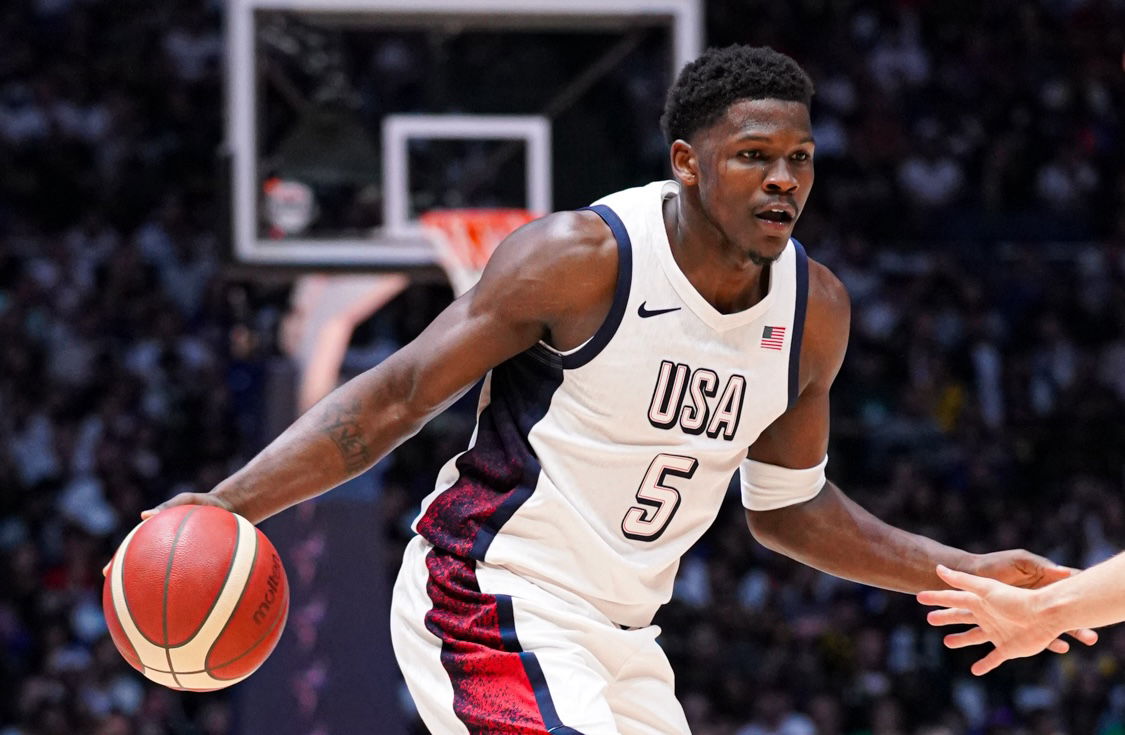

PARIS, France — At 22 years old, Minnesota Timberwolves superstar Anthony Edwards has continued to emerge as one of the NBA’s most dynamic talents. Coming off an All-NBA Second-Team campaign that ended with a Western Conference Finals appearance, Edwards is set to help Team USA compete for a gold medal.
Watch What’s Trending Now!
For a young talent like Edwards, competing for Team USA not only serves as a chance to compete against the world’s best on a global stage while representing the United States, but it’s also a chance to learn from some of the incredible talents on the roster alongside him. This year’s group is exceptionally experienced, with a list of names headlined by LeBron James, Kevin Durant, and Stephen Curry on a roster that includes seven players who have won at least one gold medal.
Edwards, who finished the season averaging 25.9 points, 5.4 rebounds, and 5.1 assists with the Timberwolves, continues to cement himself as one of the NBA’s elite players. As he’s grown his game, Minnesota has emerged as one of the most difficult teams in the league to handle and will only continue in that regard. How can this translate to Team USA as a first-time Olympian?
ADVERTISEMENT
ADVERTISEMENT
For in-depth insight, I spoke with Tom Crean, Edwards’ former college head coach at Georgia, during a phone interview for EssentiallySports regarding Edwards’ continued development and for perspective on his role with Team USA. Last year, Edwards was an integral part of the American group that competed at the FIBA World Cup and now returns to help compete on the Olympic stage, serving as the foundation of his bright future with the program.
Crean has always seen impressive qualities in Edwards’ approach, even as he went from being a high school senior to entering his one-and-done freshman season with the Georgia Bulldogs in the SEC. “The premium he puts on winning, that the work is there, the work has been there, and he was an incredibly hard worker in college, but he had a lot to learn,” Crean detailed about Edwards’ development. “He came into us as a high school senior, so he had a lot to learn about the intensity required, how you had to practice every day, how you had to prepare, how you had to watch film.”
ADVERTISEMENT
Now, after four NBA seasons, Edwards has sharply matured with the help of the Timberwolves’ coaching staff working to get the most out of him. However, it all starts with a self-starter mentality.“There were a lot of first-time learning situations for him, but he’s built on all of that, and I think what they’ve done in Minnesota has done a really good job of helping him improve,” Crean added. “He’s going to be in the gym, whether they’re with him or not, so the fact that they have people there who are with him and they’re going to be in there with him and help him is important. That’s good because Anthony’s a self-starter.”
ADVERTISEMENT
Crean added that gradual team success with the Timberwolves over the past few years after being in a rebuild has only accelerated Edwards’ progression. “What he’s done is he’s taken that work, it’s built his confidence, he’s had some success, and he sniffed winning last year, and then this past season, he really got a great big dose of it. I think that’s what he needed. He needed to sense it and sniff it a little bit that year before, which propelled him into this year. I think it’s going to, or this past season, and I think it’s going to take him even further this coming year.”
As it stands, Edwards remains a fixture in Team USA’s rotation, even when other young guards like Tyrese Haliburton have seemingly fallen out of favor in the mix. There are various reasons that go into Edwards being a strong fit for this group.
ADVERTISEMENT
What makes Anthony Edwards such a strong Team USA fit?
When a player competes with Team USA, a collective unselfishness is required to compete for a gold medal. The Americans face the unique challenge of usually having a drastically different set of personnel in each Olympic competition with limited time to build chemistry and continuity before entering high-stakes moments. Other national teams spend years developing these bonds, particularly by competing in FIBA competitions almost yearly.
“I think he just fits in very well with them. He’s respectful, but he’s never in awe, and I think that’s what you want out of somebody that’s young like that that plays,” Crean said about Edwards’ fit with Team USA.
ADVERTISEMENT

ADVERTISEMENT
Only 12 players are chosen for Team USA, and a lot goes into that selection process. Certain qualities must be present in a player for the program to trust that they will be a cohesive group member and provide the best chance of winning a gold medal. Crean sees these qualities in Anthony Edwards, who he regards as being a highly competitive player who is focused on winning at the highest level.
Top Stories
Calls Mount Against NBA Refs After Stephen Curry Wrongfully Punished vs Timberwolves
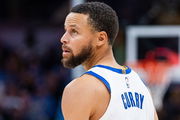
Lakers’ Gabe Vincent Dishes on LeBron James, Luka Doncic’s Sacrifices, Role on the Team and More (Exclusive)
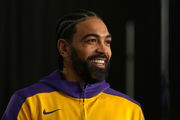
Lakers Champ Isaiah Rider Breaks Silence On Arrest For Order Violation
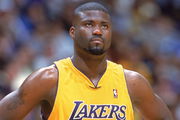
Caitlin Clark, JuJu Watkins Announce Injury Update After Months of Battle
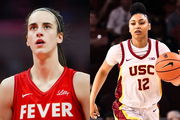
Arrest For Shaquille O’Neal’s Stolen Range Rover Made But More Bad News Awaits
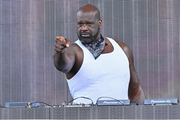
After losing to Canada in the third-place match, Team USA finished fourth at the FIBA World Cup, but Edwards gained a stronger familiarity with how the program operates. Whether it’s with the style of play or simply working with the coaching staff that features some of the best minds in the game, including Steve Kerr as head coach and Erik Spoelstra, Tyronn Lue, and Mark Few as assistant coaches, Edwards gained a stronger familiarity with how the program operates.
“He took it very, very seriously. And I think any time you get an opportunity to go into that environment, even though it wasn’t the actual Olympics, it prepares you for the Olympics because, especially with the coaching staff, it’s not the first time,” Crean said. “You’re used to the way they do things, you’re used to the way they present, you’re used to the way they coach, you’ve got some new players, obviously with some of the better guys, but he’s never been in all of those guys anyway.”
ADVERTISEMENT
When watching Edwards play during Team USA’s preparation process, Crean emphasized the young guard’s capability to play at different speeds, the need to be more assertive with the ball when drawing traps, and some details to fine-tune in decision-making situations with the ball. Regardless, Crean feels Edwards is more than ready for these big moments.
“He can play at different speeds… The other thing he can see is so well, right? If he sees that double or if he sees that trap, now he’s got to be stronger with his passes, and he’s got to be a little bit better with his decision-making from watching these exhibitions, but he can make those passes, and he will make those passes,” Crean explained. “I think when you have that, that, that, he just, there’s so many different things they can do with him. But he’s not afraid of the big moment either. And I think that that’s going to help them at some point in time as well.”
While Edwards is playing next to many great talents, Crean emphasizes the need for the Timberwolves superstar to hone in on providing a significant impact defensively and as a rebounder—doing the dirty work necessary to achieve success. Regardless, his competitiveness in guarding the ball makes him a strong fit for how Team USA wants to switch in ball screen coverage, enabling the team to pressure the ball in ways that can take the opponent out of its element.
“I think he’s got to be able to create even more off the defensive end because I think he can. I think he’s going to have to be a real defensive-minded and rebounding-minded player for this team to win the way that they can,” Crean said when describing what Edwards must do with Team USA.
“I think in the way that they’re defending, with so much switching, I think he fits really, really well into that because he’ll fight you. He plays with strength… You’re not going to get him in tough situations inside where he won’t compete on a matchup. There’s no question he can put great pressure on the ball, but he’s also fearless.”
Gaining this experience helps Edwards’ development, and he can also benefit from mentorship from NBA legend Dwyane Wade, one of Crean’s former Marquette stars, and the basketball greats on the current Team USA roster.
Learning from Dwyane Wade, plus NBA greats on Team USA
During Team USA’s training camp in Las Vegas, Dwyane Wade was among the players honored by USA Basketball for his contributions in previous Olympic cycles. While on that visit, Wade talked with Edwards, sharing some wisdom from his FIBA experiences, highlighted by his presence on the 2008 “Redeem Team.” This helped the program respond from finishing with only a bronze medal at the 2004 Athens Games to taking the gold medal at the 2008 Beijing Games.
“I think he’ll get a great benefit. One of the things that Dwayne did was when he was in Las Vegas at the training camp, and when they honored some of the past teams, he spent some time talking to [Edwards],” Crean said.“As far as the preparation, Dwayne has done a great job with so many of our former players over time, but especially in a case like Anthony now because he’s going to go through many of the same things that Dwayne went through. So I think it’s an incredible benefit.”

Wade participated in two Olympic games and the FIBA World Cup in 2006, which helped to accelerate his development as a player and a leader. Crean felt that this helped the three-time NBA champion continue to build trust with teammates and further prioritize getting the best shot on a given possession, considering how important it is to do so in the FIBA setting with a 40-minute game.
“I think Dwayne learned so much from 2004 to 2008. The difference and all that goes into this and what you have to do in the sense of building trust with your teammates, making the game easier for your teammates, and passing up what you think might be your shot to get a teammate a better shot,” Crean detailed, relating Wade’s past experiences with what lies ahead for Edwards.
“I don’t think there’s any downside whatsoever for a player like Anthony to be in this no matter what because there’s what you learn by doing, but there’s also what you learn by hearing, but very importantly, there’s what you learn by seeing and Anthony Edwards is a very astute, aware guy, and I think that will be a great benefit for him.”
With how much time Team USA members spend together throughout the Olympic journey, there is ample opportunity for someone like Edwards to learn from someone he grew up watching and respecting, like Kevin Durant. Crean sees a significant value in this opportunity for any young player.
“I think because there’s so much natural conversation that goes on inside of that, and he has a respect for players, he has respect for the game, they see how hard he works, and they see his personality, and they know what he’s done already in the NBA,” Crean detailed about Edwards. “Anthony is a very open-minded guy. He really is. I think he lets you know that he wants to get better by how you see his work and how he approaches things. With greats like that, it’s very easy to like him. He’s a very likable person. He’s very competitive. He’s very confident, but he’s not standoffish.”
When other players see how hard Edwards works, it’s easy to understand why veteran superstars gravitate to him and are eager to share wisdom. Despite that, it’s important to note that these players understand that Edwards is capable of strongly influencing their chances of winning a gold medal in the short term, as much as some of them enjoy passing the torch to the next generation.
“I think because we’re talking about some of the greatest veterans and players in the game that are on that team because they have that, they see that joy that he has, and that level of work that he puts in, and that confidence that he has, they want to help him, and I think that’s really, really important,” Crean said. “But at the same time, I think they also know that he can help them win, so they’re not only giving him something for his future, but they’re giving him something for his present. That’s going to help them as well.”
Wade’s connection with the veteran members of the team, including his former teammate famously LeBron James, as a championship-winning tandem in South Beach, only helps Edwards. However, there are more connections to take into consideration, particularly with the coaching staff.
Dwyane Wade’s longtime former coach and friends can help Anthony Edwards
While some of the veteran players on Team USA are Dwyane Wade’s friends that can benefit Anthony Edwards in his development, there is a very talented coaching staff, including overlap from Wade’s playing career with Miami Heat head coach Erik Spoelstra being among the assistants on the Olympic coaching staff.
“I think it’s fantastic, especially in a situation with having Erik there, because Erik does know how Dwayne thinks, and Erik does know that Dwayne thinks a lot of Anthony,” Crean emphasized. “Some of Dwyane’s closest friends are on that team, but he also looks after Anthony and wants to see him succeed. There’s that common commonality there. I think that’s very helpful.”
Team USA is led by a very accomplished, championship-winning coaching staff that naturally draws the respect of the players on the team, which only helps. “I think that they’re all very comfortable in what they do. Nobody on that team should look at one of those coaches and ever allow themselves one second to question why or what. Those guys are all highly successful championship-level coaches,” Crean detailed. “And I think that’s one of the beauties of this thing, and I think now it becomes so much not as not about the coaching. Obviously, in the games, it does, but it becomes about the possession by possession awareness and intensity level that that team will have to win big. And that is Anthony. That’s everybody.”
If the Team USA coaching staff can ensure the players compete at a high level in effort and attention to detail, Crean sees it likely too daunting for many teams to defeat them. A focused approach is needed to limit turnovers, make necessary defensive rotations, box out, and address all of the other nuances that go into playing winning basketball.
“When they lock in, and they guard the way they did in that exhibition against Canada, boy, they’re going to be tough to beat for anybody. But if they have letdowns, if they have many turnovers that turn into baskets, if they don’t block out if they don’t get back and transition, and then all bets are off, anything can happen,” Crean said. “And I think now it becomes a situation where the players do what they know. Doing it more consistently and doing it all the time every game, I should say.”
There is plenty of basketball left for Edwards to play before he returns to the Timberwolves, but what’s next in his development? What can he take away from his time with Team USA and apply to his game next season?
What’s Anthony Edwards’s next step in his development?
While Anthony Edwards is already such an impactful player, there is naturally still room for growth in his development. He’s already an electrifying talent capable of throwing down emphatic, posterizing dunks, or shifting a defender with his handle before making tough shots. However, he can still optimize some nuances of the game as he tries to maximize his potential.
“I think keep doing all the little things,” Crean stated. “Being great in transition defense, becoming even better off the ball, and using his anticipation and his awareness to be even better on the weak side. I think it’s continued development…
Crean doesn’t see any glaring weakness in Edwards’ game but does see such impressive potential in his game to reach even greater heights. “I don’t think there’s anything that is absolutely glaring that he has to get better at outside of utilizing certain things more.
From the perspective of attacking with the basketball, Crean believes Edwards could continue to grow when attacking, going left and working his way back to his right more, leveraging his talent. “Not only going left but going right and getting back to his right hand even more and utilizing that to beat people,” Crean detailed about Edwards.
Part of player development is gradual improvement rather than anything major. Among those areas, Crean sees that Edwards can maximize his shot quality and expand his shooting range to open up his game further. Defenses would have to determine whether to engage him tightly and risk giving up the gap on a drive, elect to switch in ball screen coverage to take away the pull-up, or risk being made to pay for allowing him to get to that shot.
“I think it’s certainly continuing to take good shots because he’s on a really good team that’s talented, can get shots, and can take those good shots. He’s capable,” Crean explained. “I think there’s also building his range, even a little bit more, and continue to do that year in and year out.”
Defensively, Edwards has already embraced the challenge of being an impactful on-ball defender by utilizing his athleticism and size. Crean believes the next step will be to become more attentive off the ball. With the Timberwolves being anchored by four-time Defensive Player of the Year Rudy Gobert, Edwards further improving defensively would only enhance what Minnesota can achieve as an already elite defensive group seeking to win a championship.
“Being more locked in longer defensively, and getting more done on that weak side of the floor because when he locks in on the ball, you can’t get by him,” Crean explained about Edwards’ defensive development. “He’s just got incredible strength, balance, and toughness, but off the ball is where he could make even more hay and make even more things happen. And I think that’s what he’s capable of doing.”
When discussing Edwards’ career years from now, we’ll likely reflect on his time with the 2024 USA Olympic team as an integral moment.
ADVERTISEMENT
ADVERTISEMENT
ADVERTISEMENT

